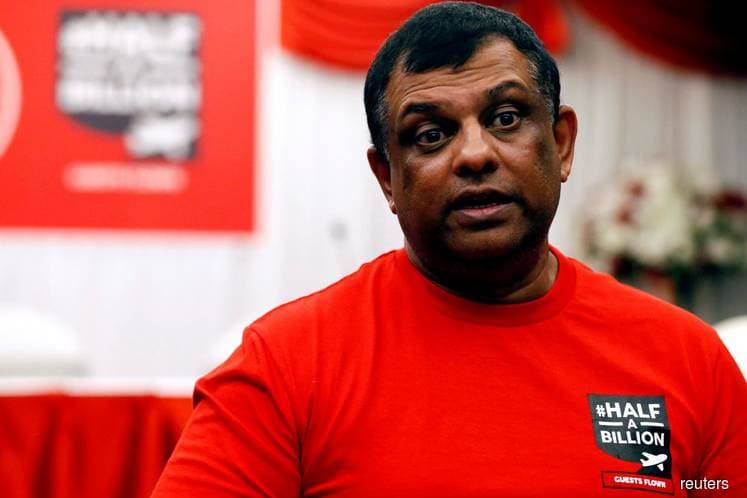
This article first appeared in The Edge Financial Daily on June 26, 2018
KUALA LUMPUR: Tan Sri Tony Fernandes, the group chief executive officer of AirAsia Group Bhd, the largest low-cost carrier in Asia, took to social media yesterday to slam the Malaysian Aviation Commission (Mavcom) again over the standardisation of the passenger service charge (PSC) between the Kuala Lumpur International Airport (KLIA) and klia2 in Sepang.
In his LinkedIn post entitled “One-size PSC does not fit all”, Fernandes said an airline in any country cannot function without government support. “The standardisation of the PSC between the two terminals is senseless and fails to reflect the cost incurred in developing and managing the airport in accordance with ICAO’s (International Civil Aviation Organization) policies, which encourage the development of charge-based formulas to benchmark the level of airport facilities and services,” he wrote.
“Evidently, no airports are built the same and there should not be a ‘one-size-fits-all’ approach. Imposing equal charges for different levels of facilities and services is discriminatory as it puts the less equipped airport at a disadvantage and more importantly, affects the low-cost market which is much more sensitive to price variations,” he said.
Fernandes also stressed that the PSC rate should be based on an airport’s infrastructure. “The PSC and [RM1] levy that have been imposed by Mavcom in lieu of ‘being financially independent of the government’ and ‘to develop the aviation industry’, but it has contributed in no way except to the 3% decline in tourist arrivals to Malaysia,” he pointed out.
“Mavcom exists for consumer rights and to oversee the civil aviation industry to support the nation’s economic growth, but since its establishment, not only have consumers been bearing additional taxes and charges without reaping any benefits, Malaysia is now one of the few Asean countries with a decline in tourism,” he lamented.
Fernandes also said it is not the airport taxes nor charges that can develop the industry. “For 16 years, the steady growth in [the] volume of passengers that we have carried was solely due to lower fares and connectivity,” he said.
In a separate Facebook posting yesterday, Fernandes said he has been fighting never-ending “battles” for the Malaysian people for the past 16 years for a lower PSC, open skies policies and new routes.
“When airport tax was equalised at klia2 [on Jan 1], we were the only ones who fought and we are still fighting because we truly believe that it isn’t fair for passengers to be charged the same airport tax between KLIA and klia2 when the facilities and services are of completely different levels. As you can see, no airports are built the same and there should not be a ‘one-size-fits-all’ approach,” he said.
“I have always dreamed of an aviation industry free from political intervention and one where decisions are based on merits and where healthy competition exists. It is a highly regulated business which requires all kinds of government support, which means an invisible hand exists where we would never really be able to operate freely,” he added.
Fernandes also took to Twitter to vent his frustrations with Mavcom yesterday, questioning the regulator’s claim of protecting consumers on one hand, while charging them on the other, despite the difference in infrastructure between KLIA and klia2, the latter of which AirAsia operates out of. “Mavcom claims it’s protecting passengers. How can they when they want to raise airport tax (PSC) and make KLIA and klia2 [have] the same airport tax ... when it’s clear that klia2 is vastly inferior to KLIA. How are they protecting consumers?” he asked.
“Asean and domestic airport tax is already the same. And we have been protesting, saying our passengers are getting a raw deal. No aerotrain. Not even enough seats in each lounge, narrow corridors, poor check-in facilities, [and we have to] go through a shopping mall to get to the check-in desk,” he said. Fernandes cited Shangri-La Hotel and Tune Hotel to reflect the differences in facilities between KLIA and klia2. “Would Shangri-La and Tune Hotel charge the same [room rates]? No. Because no one would come to Tune Hotel [if it does that]. Shangri-La has much better facilities. But the rakyat has no choice. Only one airport. So Mavcom should ensure airports do not overcharge or have same facilities [between KLIA and klia2],” he said.
“Mavcom should walk the talk. Not just put [a] press release out and say they are protecting consumers. Is protecting consumers allowing MAHB (Malaysia Airports Holdings Bhd) to charge the same airport tax between KLIA and klia2?” he added.
AirAsia and Mavcom have been at loggerheads after the aviation regulator rejected the airline’s appeal against the hike in PSC of non-Asean flights out of klia2 to RM73 instead of its proposed RM37. Starting Jan 1, the PSCs for all airports in Malaysia have been standardised at RM11 for domestic destinations and RM35 for Asean destinations. For places beyond Asean, departing passengers have to pay RM73 if they are flying out of KLIA and other airports excluding klia2, where passengers are paying a PSC of RM50.